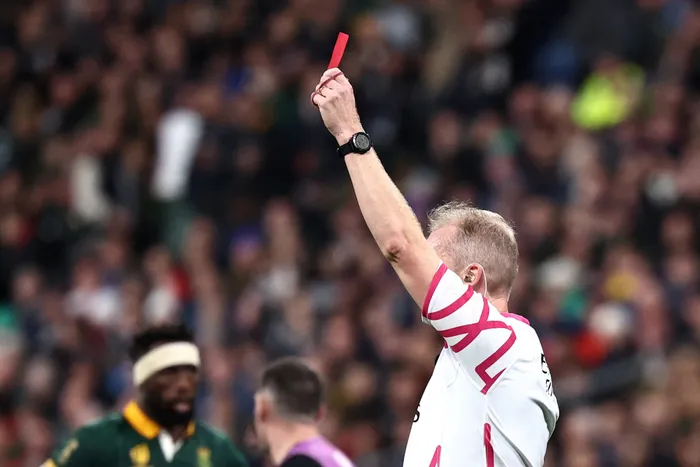New World Rugby red card law is welcome since it punishes the individual, not the game
COMMENT

English referee Wayne Barnes shows a red card to All Blacks captain Sam Cane in the 2023 Rugby World Cup final against the Springboks. The reduced punishment for a red card is one of World Rugby’s proposed law changes. Picture:
Image: Anne-Christine Poujoulat, AFP (file)
Comment by Mike Greenaway
World Rugby has confirmed that the controversial 20-minute red card system will be used in all rugby competitions from August 1.
This is despite an outcry, mostly from the northern hemisphere, where critics contend that it will encourage foul play because 20 minutes is insufficient punishment.
The new law, which has been trialled for a year in several competitions, permits a team to replace their red-carded player when a 20-minute period has elapsed.
This means that the team with the offender is only down to 14 men for 20 minutes.
World Rugby argues that this means games are not ruined as a spectacle because of a red card.
Many southern hemisphere folk, and I am among that number, feel this is correct.
Firstly, the culprit’s game ends, so he or she has been punished, their team has been compromised for 20 minutes, but then it is 15 against 15 once more, and that gives the spectacle a much better chance of surviving.
Also, the offending player often has done so accidentally.
New Zealanders point out the example of All Black Sam Cane’s red card in the 2023 World Cup.
The captain clearly did not mean to make contact with the head of Jesse Kriel, in the 28th minute, and his team played without him for the rest of the game.
Under the new law, Cane would have been replaced in the 48th minute.
Ireland and France are prominent European countries to publicly oppose the law when it was applied in the last Six Nations.
They feel that this law is a step backward in the war against concussion.
Earlier this year, there was a clamour from the north that the law should not be applied in the series between the British and Irish Lions and the Wallabies later this year.
But unfortunately for those critics, World Rugby have said the red card law will apply in that series, and also at the approaching Women’s World Cup.
World Rugby chairman Brett Robinson points out that copious information gathered from a year of trials indicates that the law has made no difference to the amount of dangerous tackles in rugby – the figure had not gone up or down.
I think that makes sense. A player doesn’t go into a game thinking, “I can be replaced in 20 minutes, so I’m going to take somebody’s head off.”
Robinson said: “Our mission is to ensure rugby is a compelling sport to play and watch. The 20-minute red card preserves the fairness and drama of elite competition by punishing the individual, not the entire team or the spectacle.
“Player welfare is non-negotiable. We monitor data around head injuries, tackle height and concussion rigorously – and transparently.
“If evidence ever indicated this trial posed greater risk, we would end it immediately.”
A few weeks back, All Blacks great Justin Marshall gave his view, and I reckon he is spot-on.
The former scrumhalf said that the paying public gets penalised when games are ruined by red cards.
“People are going to spend a load of money to come from the UK to watch the British and Irish Lions series, and what if we get two red cards in the first 10 minutes of the first two Test matches, and even the third, heaven forbid?” he said on the GBRANZ podcast.
“(With the new law) It is 20 minutes that a team’s got to cope, where the other team have a massive advantage, and then that player is out of the game.
“He has been punished, and he will get punished afterwards.
“And the game has only been punished for 20 minutes. Can’t we just see common sense?”
Related Topics: